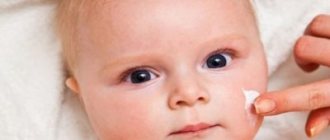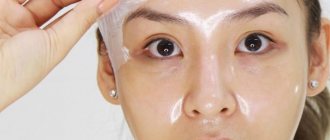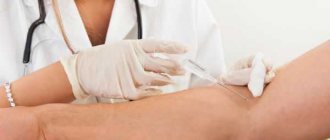How allergies develop
An allergy is an atypical response of the immune system to foreign substances (allergens), when a special inflammatory reaction is triggered in the body and its own tissues are damaged by its own antibodies.
The mechanism of development of an allergic reaction occurs in 3 stages:
- First Contact and entry of an allergen into the body for the first time. Immune cells recognize them as a foreign object and begin the process of producing antibodies. In turn, the antibodies attach to the surface of “mast” cells located under the mucous membranes and epithelium and “freeze” in anticipation of new contact with the allergen, which can last more than a year.
- Second: Secondary entry of the allergen into the body, where it binds to antibodies that are localized on the walls of “mast” cells, which triggers the start of the “mast” cells and they begin to secrete biologically active substances (histamine and others). These biologically active substances are inflammatory mediators (support inflammation), cause vasodilation, increased permeability of the vascular wall, swelling and other signs of allergy.
- Third, as a result of the described effects of inflammatory mediators, swelling, redness and itching appear - direct signs of inflammation. In extreme cases, when an allergen enters the bloodstream, the blood vessels greatly dilate, which leads to a sharp drop in blood pressure - anaphylactic shock.
Sources
- Roff AJ., Morrison JL., Tai A., Clifton VL., Gatford KL. Maternal asthma during pregnancy and risks of allergy and asthma in progeny: a systematic review protocol. // JBI Evid Synth - 2022 - Vol - NNULL - p.; PMID:33795583
- Quezada-Pinedo HG., Mensink-Bout SM., Reiss IK., Jaddoe VWV., Vermeulen MJ., Duijts L. Maternal iron status during early pregnancy and school-age, lung function, asthma, and allergy: The Generation R Study . // Pediatr Pulmonol - 2022 - Vol - NNULL - p.; PMID:33657279
- Ogawa K., Pak K., Yamamoto-Hanada K., Ishitsuka K., Sasaki H., Mezawa H., Saito-Abe M., Sato M., Yang L., Nishizato M., Konishi M., Sago H ., Ohya Y. Association between maternal vegetable intake during pregnancy and allergy in offspring: Japan Environment and Children's Study. // PLoS One - 2022 - Vol16 - N1 - p.e0245782; PMID:33507986
- Tanaka K., Okubo H., Sasaki S., Arakawa M., Miyake Y. Maternal caffeine intake during pregnancy and risk of food allergy in young Japanese children. // J Paediatr Child Health - 2022 - Vol - NNULL - p.; PMID:33464698
- Wolfson AR., Mancini CM., Banerji A., Fu X., Bryant AS., Phadke NA., Shenoy ES., Arman W., Zhang Y., Blumenthal KG. Penicillin Allergy Assessment in Pregnancy: Safety and Impact on Antibiotic Use. // J Allergy Clin Immunol Pract - 2022 - Vol9 - N3 - p.1338-1346; PMID:33212237
- Zhang HJ., Dong XL., Zhang YF., Fang YF., Zhang HY. . // Zhongguo Dang Dai Er Ke Za Zhi - 2022 - Vol22 - N11 - p.1221-1225; PMID:33172559
- Mensink-Bout SM., Voortman T., Dervishaj M., Reiss IKM., De Jongste JC., Jaddoe VWV., Duijts L. Associations of Plasma Fatty Acid Patterns during Pregnancy with Respiratory and Allergy Outcomes at School Age. // Nutrients - 2022 - Vol12 - N10 - p.; PMID:33036333
- Tuokkola J., Lamminsalo A., Metsälä J., Takkinen HM., Tapanainen H., Åkerlund M., Niinistö S., Toppari J., Ilonen J., Veijola R., Knip M., Kaila M., Virtanen SM . Maternal antioxidant intake during pregnancy and the development of cows' milk allergy in the offspring. // Br J Nutr - 2022 - Vol - NNULL - p.1-8; PMID:32943116
- Bonadonna P., Mauro M., Preziosi D., Pravettoni V. Pregnancy and Hymenoptera venom allergy. // Curr Opin Allergy Clin Immunol - 2020 - Vol20 - N5 - p.465-469; PMID:32769711
- Venter C., Agostoni C., Arshad SH., Ben-Abdallah M., Du Toit G., Fleischer DM., Greenhawt M., Glueck DH., Groetch M., Lunjani N., Maslin K., Maiorella A. , Meyer R., Antonella M., Netting MJ., Ibeabughichi Nwaru B., Palmer DJ., Palumbo MP., Roberts G., Roduit C., Smith P., Untersmayr E., Vanderlinden LA., O'Mahony L Dietary factors during pregnancy and atopic outcomes in childhood: A systematic review from the European Academy of Allergy and Clinical Immunology. // Pediatr Allergy Immunol - 2022 - Vol31 - N8 - p.889-912; PMID:32524677
Factors causing allergies
Factors that cause allergies (allergens) for allergy sufferers can be completely harmless substances that healthy people do not attach importance to. First of all, allergies can be triggered by pollen, hair and fluff of pets, dust that accumulates in carpets, curtains, pillows (it is in it that microscopic mites that provoke allergies are found).
Some foods can also cause allergies: citrus fruits, seafood, exotic fruits, red vegetables, fruits and berries. Poisonous insects are also dangerous for allergy sufferers: bees, wasps, bumblebees and others. In addition, allergies can result from living in an environmentally unfavorable area, exposure to industrial hazards, household chemicals, medicinal and decorative cosmetics, and, of course, medications.
And, speaking of allergies, we must not forget about the influence of severe stress and psycho-emotional experiences on an “inadequately tuned” immune system.
Allergy medications for pregnant women
Is it possible to take anti-allergy medications during pregnancy? Doctors say yes, but with certain reservations and only under the supervision of specialists. According to experts, most drugs during this period are considered safe, however, doctors do not have enough research data on individual groups of drugs. There has not been a large human study to definitively confirm the absolute safety and effectiveness of these medications in women who are pregnant or breastfeeding. Doctors have very limited information and observational data on women who have previously taken the medications. How are medications selected if a woman has allergies? First of all, these must be safe products for patients of reproductive age. Many medications that women usually take for allergies may fall out in the first trimester of gestation, when the expectant mother still does not know about her new situation. These drugs should not have been found to have adverse effects on the fetus or placenta. Therefore, scientists and practitioners need to collect much more data on medications taken specifically during pregnancy. Today, a unified electronic database on drugs used during lactation has been created, and reference books on drugs for pregnant women are also being compiled.
The effect of allergies on the fetus
Allergies, in turn, are not dangerous for the unborn baby due to their manifestations, but are fraught with indirect complications:
- allergy symptoms deplete the physical strength of the pregnant woman’s body and weaken the already suppressed immune system, which can affect the growth and development of the fetus (the birth of a low-weight and weak child);
- taking some antihistamines worsens the condition of fetoplacental blood flow, which disrupts the supply of nutrients and oxygen to the fetus;
- allergens and antibodies to them do not penetrate the placental barrier, but it is possible that the child will develop allergies after birth (hereditary predisposition).
Allergy symptoms during pregnancy
During pregnancy, signs of allergies usually subside. This is due to the woman’s body producing the hormone cortisol, which has anti-allergic properties. Even hay fever or asthma may not produce symptoms while expecting a baby. But, unfortunately, after delivery, the level of hormones decreases, and allergic symptoms reappear.
Isolated cases have been recorded in which all allergy symptoms worsen during pregnancy. We are talking about hay fever or allergic rhinitis. An exacerbation of the pathology usually begins in the second trimester. But before delivery, the condition most often improves significantly.
Allergy treatment
It’s worth mentioning right away that allergies cannot be cured, you can only stop its acute manifestations. Most antihistamines are contraindicated during pregnancy, and those that can be taken can only be decided by a doctor, provided that the benefits of taking anti-allergy drugs outweigh the possible risk to the fetus. Therefore, you should not self-medicate an allergic reaction, especially expectant mothers.
Ideally, at the stage of pregnancy planning, a woman with allergies should visit an allergist in order to conduct a special diagnosis for potential allergens and, if possible, avoid contact with them.
But what to do if acute allergosis develops during pregnancy (for example, urticaria, rhinitis, conjunctivitis)? First of all, it is recommended:
- avoid contact with the suspected allergen;
- call a doctor;
- take a suprastin tablet (the drug is contraindicated in the first trimester).
Medicines
During pregnancy, you should be very careful when taking medications, including antiallergic drugs. It is necessary to constantly consult with an allergist and take medications only if the possible risk of impact on the fetus does not exceed the benefit received.
None of the antiallergic drugs guarantees complete safety for the unborn child. Tavegil is especially suspicious. When it was fed to pregnant rats during a scientific experiment, the newborn rats developed heart defects and paw defects. And although medical journals do not write about deformities in a person after taking tavegil, it is still not worth the risk. In this regard, diazolin is considered relatively safe: it has been used for a long time, no obvious negative effects on the fetus have been noted. However, it is advisable to drink even diazolin only as a last resort, not for long and in small amounts.
Allergy prevention
Disease, and especially allergies, are easier to prevent than to treat. Therefore, pregnant women with a tendency to allergic reactions are advised to follow a number of rules:
- ventilate the room as often as possible, carry out wet cleaning daily, knock out potential “dust collectors” weekly: pillows, blankets, carpets, etc.;
- exclude potentially allergenic foods from the diet (honey, nuts, seafood, citrus fruits, tomatoes, raspberries and strawberries, milk and cheese, processed foods, spicy, salty and pickled foods; chocolate);
- get rid of pets during pregnancy (give them to loved ones) and minimize contact with them;
- give up bad habits, especially smoking;
- Do not use new (untried before pregnancy) cleaning products, detergents and skin care products.
Antihistamines
One of the most popular classes of medications that are used for allergies in women both outside of pregnancy and during pregnancy are antihistamines. These are the most studied of the medications used during pregnancy. Data shows that 1 in 10 or more (10% to 15%) pregnant women take antihistamine medications, which are available over-the-counter and prescription, to treat symptoms such as seasonal asthma and pollen allergies. They eliminate allergy symptoms such as a runny nose and itchy, watery eyes, and also alleviate other problems such as nausea and indigestion due to food reactions. Antihistamines include those with loratadine, cetirizine and diphenhydramine. But how safe is it to use them in courses or continuously?
Allergy medications and birth defects
One of the reasons why antihistamines have come under scrutiny is that early studies identified a potential link between antihistamines and birth defects.
However, a global review of the scientific evidence, which included more than 50 major articles as of early 2014, found that most drugs do not appear to be associated with birth defects. An association has also been suggested between prenatal exposure to loratadine and the health of male infants born with hypospadias. This is a congenital defect in which the opening of the urethra is not at the tip of the penis, but under it. The disorder affects the urination process and also leads to problems with sexual function in adulthood if the defect is not corrected in childhood. Treatment usually involves surgery to correct the defect. But further research did not confirm such a connection.
Antihistamines have not been found to cause birth defects of any kind. Therefore, if there are clear indications and a confirmed diagnosis of allergies, the expectant mother can take them without fear for the health of the baby.











